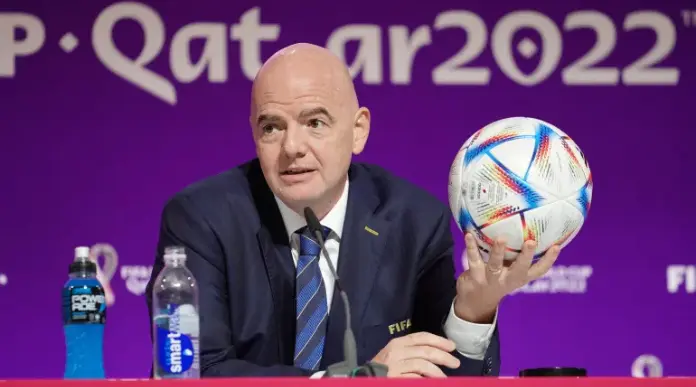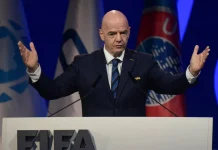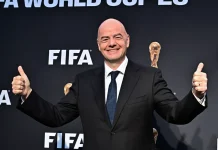In 2025, FIFA intensified its efforts to root out racism in football, launching a comprehensive anti-racism programme with sweeping reforms. These efforts include new disciplinary measures, symbolic gestures, stricter matchday protocols, and increased penalties. Yet, despite these ambitious initiatives, the battle against racism in the sport remains far from won. Political inertia, uneven enforcement by national associations, and complex legal landscapes continue to hinder meaningful progress.
Reform at the Top: FIFA’s Five-Pillar Framework
In 2024, the 74th FIFA Congress approved a landmark anti-racism strategy. The plan redefined racist behavior as a punishable disciplinary offense across all 211 member associations. A new globally recognized “crossed-arms” gesture was introduced for players and referees to signal racist incidents. Referees were empowered with a three-step protocol allowing them to halt, suspend, or even abandon matches in response to abuse. Financial penalties for racist offenses were dramatically increased, with fines rising to as much as CHF 5 million. FIFA also committed to empowering players, officials, and spectators to help identify perpetrators and reserved the right to overrule national associations that fail to act decisively.
These policies aim to create a unified stance on racism within football, reinforcing FIFA’s declared “zero tolerance” approach. However, converting policy into practice requires cooperation from national governing bodies, many of which operate within vastly different political, legal, and cultural contexts.
Political Complications in Global Enforcement
Despite the strength of FIFA’s directives, implementation largely depends on national football associations. In countries with weak institutions or politicized sports governance, enforcement often remains inconsistent or superficial. Some associations may lack the resources or the political independence to enforce FIFA’s rules rigorously. In other cases, governments may actively resist enforcing such measures, particularly where racism is downplayed or politicized for domestic advantage.
FIFA’s capacity to ensure uniform application across its member states remains limited. The organization’s governance model, which relies heavily on local enforcement, leaves room for interpretation and, in some cases, inaction. Without a central enforcement mechanism or the ability to impose binding sanctions quickly and transparently, FIFA risks seeing its policies diluted by uneven commitment on the ground.
Legal Gaps and National Resistance
FIFA has urged global lawmakers to treat racist abuse in football as a legally defined hate crime. While this recommendation aligns with broader human rights frameworks, it has not been uniformly adopted. Many nations continue to treat racist behavior at sporting events as public order issues rather than targeted discrimination. The legal interpretation of hate speech, and what qualifies as incitement or abuse, varies significantly between jurisdictions.
In countries where legislation on hate crimes is underdeveloped or politically contentious, enforcing FIFA’s policy becomes especially difficult. Moreover, legal processes in some countries may be too slow or inadequate to respond effectively to incidents that demand immediate action, such as in-match racist chants or social media abuse targeting players.
Football Reflects Society: Racism Beyond the Pitch
The persistence of racism in football often mirrors broader societal issues. Discriminatory behavior seen in stadiums and online forums is frequently rooted in historical tensions, social inequality, and political narratives. As such, eliminating racism from football requires more than punitive measures. It demands cultural change, education, and the promotion of inclusive values beyond the sport itself.
FIFA’s response includes partnerships with organizations such as the United Nations Office on Drugs and Crime (UNODC) to support educational and outreach efforts. However, these initiatives face significant hurdles in regions where racism is normalized or embedded in the political discourse. Bridging the gap between grassroots awareness and institutional change remains a major challenge.
The Limits of Matchday Protocols
The three-step protocol that allows referees to pause, suspend, or abandon matches represents a significant procedural advancement. Still, the success of this system depends heavily on referees’ willingness and ability to act under intense pressure. Matchday decisions often occur in emotionally charged environments, where the fallout from halting a high-profile game can be immense.
There are also concerns that referees may hesitate to follow through with all three steps due to fear of criticism, threats to their safety, or lack of institutional backing. Without unequivocal support from both FIFA and national bodies, match officials may default to less disruptive responses, undermining the purpose of the protocol.
Inconsistent Identification of Offenders
Effective implementation of FIFA’s anti-racism policies also relies on the identification and punishment of offenders. This process varies significantly depending on the resources available at stadiums, the cooperation of local law enforcement, and the broader national context.
Some stadiums have advanced surveillance systems and trained personnel capable of swiftly identifying culprits. In others, outdated technology or weak legal procedures hinder enforcement. There have been numerous cases where offenders have gone unpunished or received minimal penalties due to these structural limitations.
Host Nations Under Scrutiny
Despite reforms, FIFA continues to face criticism over its selection of host nations for major tournaments. Reports of discriminatory practices, particularly in upcoming World Cup host countries, have drawn scrutiny from human rights organizations like Amnesty International. These groups argue that racism and xenophobia in some of these societies contradict FIFA’s stated commitments to equality and inclusion.
While FIFA has introduced human rights clauses in host agreements, critics claim that enforcement is minimal and often subordinated to commercial interests. The prestige and economic benefits of hosting a World Cup can serve to legitimize regimes accused of systemic discrimination, raising concerns about “sportswashing” and undermining the credibility of FIFA’s anti-racism stance.
A Path Forward: Aligning Policy with Practice
If FIFA’s anti-racism campaign is to succeed, it must evolve beyond symbolic measures and confront the political realities that shape its implementation. This includes fostering stronger accountability mechanisms within national associations, improving cooperation with legal institutions, and expanding educational outreach.
Greater transparency in how disciplinary cases are handled, combined with external monitoring by independent human rights observers, could help close the enforcement gap. FIFA may also need to consider centralizing some aspects of its enforcement authority to ensure consistent global application of its standards.
Finally, political will remains a critical factor. Governments, sponsors, players, and fans all have a role to play in demanding meaningful action. Only through coordinated, multi-level commitment can the sport move toward genuine inclusivity and respect.
Conclusion: Ambition Versus Reality in FIFA’s Anti-Racism Battle
FIFA’s 2025 anti-racism reforms represent one of the most comprehensive attempts to address discrimination in the history of the organization. The policies are ambitious, well-structured, and rooted in a genuine desire for change. Yet the complexity of global politics, legal inconsistencies, and cultural resistance pose significant challenges to their effectiveness.
The path to eradicating racism from football will require more than institutional declarations. It demands persistent, politically courageous action, international cooperation, and a recognition that football cannot be insulated from the societies in which it is played. FIFA has taken important steps forward, but whether these steps lead to lasting change will depend on its ability—and the world’s willingness—to follow through.













